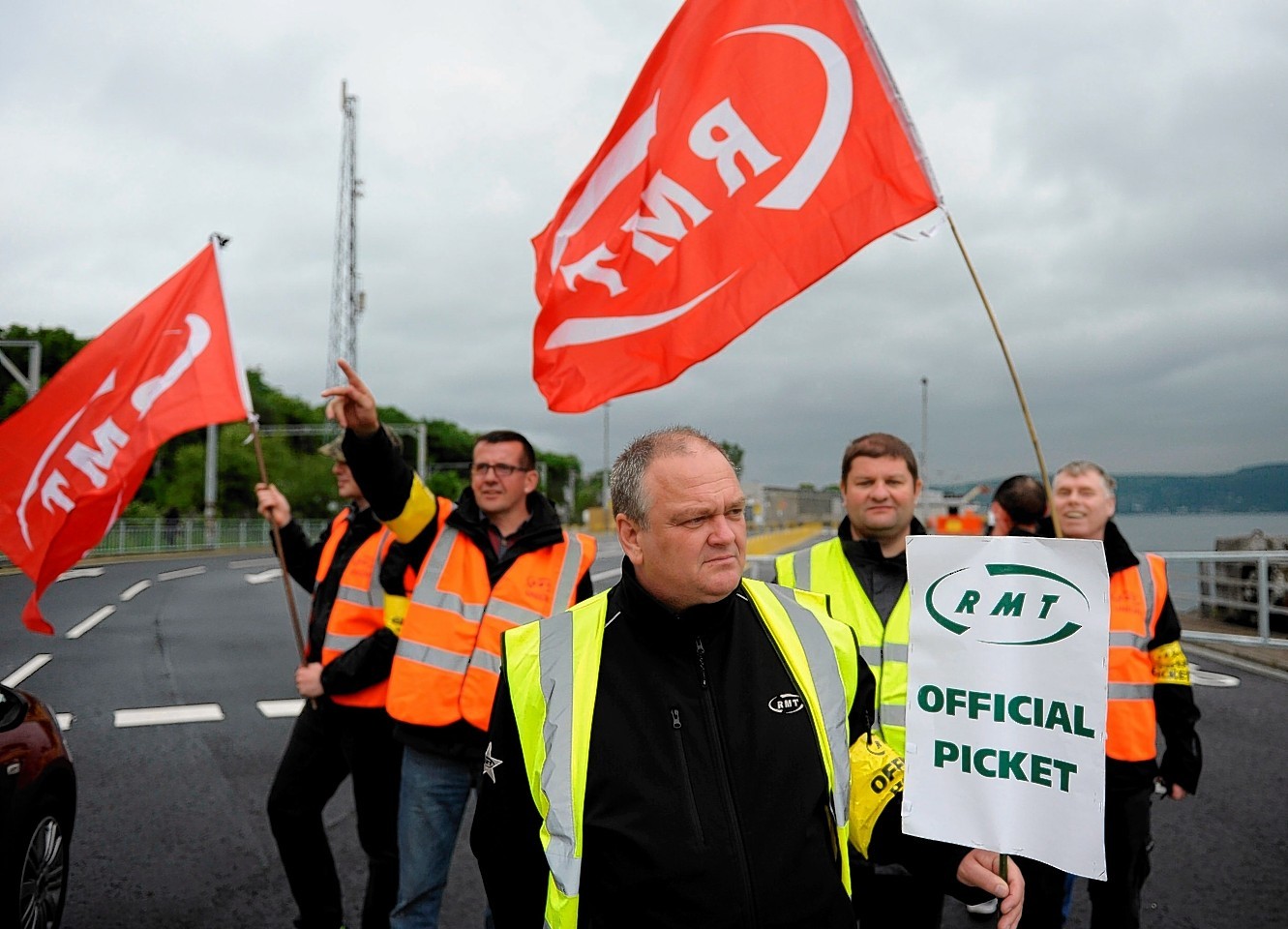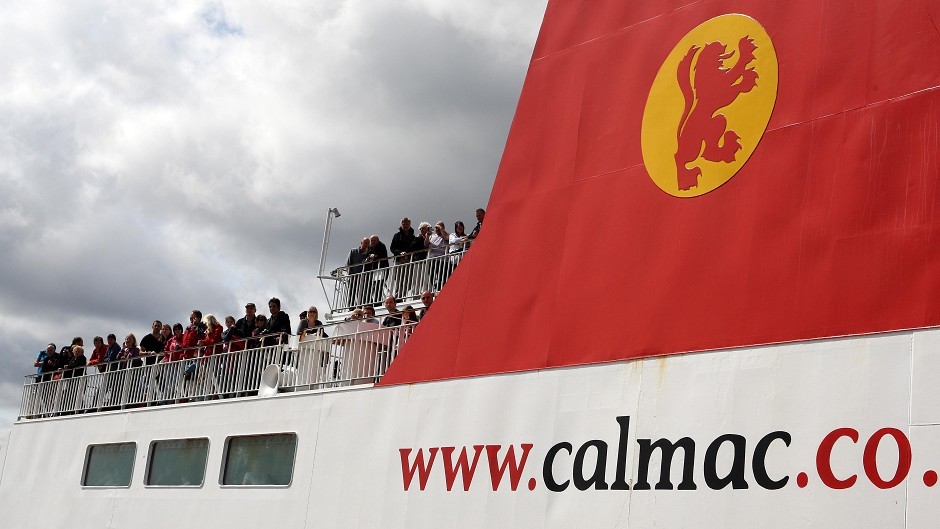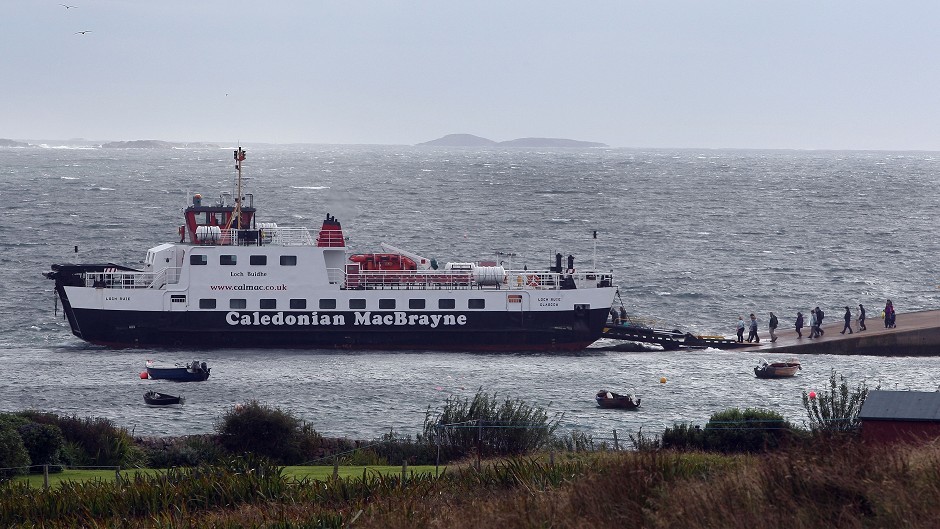Islanders and tourists are facing the threat of more ferry strikes – with the prospect of staff and bosses striking a peace deal hanging in the balance.
Union chiefs have revealed there has been “slow progress” in discussions with CalMac over jobs and working conditions.
And they have warned that negotiations scheduled for today and tomorrow are now a “last ditch” attempt at reaching agreement before more industrial action is considered.
The dispute was triggered by the tendering of the contract for CalMac’s Clyde and Hebrides ferry routes.
Businesses in the islands and on the west coast have reacted with dread to the prospect of a second strike.
The last one on June 26 left islanders and holidaymakers marooned and crippled major ferry routes.
Iain Morrison, owner of Turus Mara boat tours on Mull, said last night: “It is not good for the tourist trade on Mull. We deal with CalMac and sell tickets in their shop in Oban, so that’s not good.
“What is going to be achieved by this?
“I know there are a lot of people who work for CalMac who are not happy at having to go on strike. A lot of them live on the islands and know how much it screws everything up.
“It is the wrong time to do anything like that. All it achieves is a bad press.”
Alan MacLeod, owner of Ee-Usk and Piazza restaurants on Oban’s North Pier said: “The first strike affected business very badly, even the thought of it, with everyone having to change their plans.
“It is a really bad time of year to be doing it. I feel sympathy for CalMac but I don’t know who is to blame.”
In a circular to members, RMT general secretary, Mick Cash, said: “Members will be aware that we are still in dispute with Cal-Mac-Argyll Ferries over various assurances which were being sought prior to the tendering exercise which you and your union still oppose.
“I can report that discussions have taken place last week with both the Scottish Government and CalMac.
“It is fair to say that the talks so far have been difficult and we are concerned that the emphasis seems to be on what can’t and won’t be done rather that what can be done to solve this dispute, particularly from CalMac.
“This is bitterly disappointing, as your union suspended the industrial action in good faith to allow these talks to take place.”
He added: “The RMT has made every effort to secure a series of very basic assurances over no compulsory redundancies, staffing levels, conditions of service and pensions but to no avail.
“Further talks are scheduled, however, unless there is more movement from the company in these talks, then further industrial action cannot be ruled out.”
A Scottish Government spokesman said: “It is disappointing the RMT union feels the need to consider further strike action with two days of discussions still to take place.
“Ministers entered these talks in good faith and will continue with that constructive approach.
“The minister for transport will chair a fourth day of discussions with CalMac and the unions on Wednesday, with the aim of reaching a resolution that avoids further strike action on the Clyde and Hebrides ferry services that would impact the communities that they serve.”
Western Isles tourism
Prospects of renewed ferry chaos at the start of the English school holidays will be a further financial blow for the Western Isles tourism industry.
Hundreds of B&Bs and visitor facilities suffered a significant loss in trade during the first strike by RMT crews.
And the threat of further ferry disruption resulted in many visitors canceling trips to the Hebrides.
Anna Mackay of the Callanish Stones visitor centre on Lewis said: “It is disappointing they are doing this in the middle of the summer.
“The English school holidays are starting now and we usually get a lot of trade from that.
“Just a threat of a strike causes many people to cancel their journey.”
Outer Hebrides Tourism (OHT) was dismayed to hear that talks might again break down and called on all parties to remain focused on resolving the situation as a matter of urgency.
OHT chairman Ian Fordham said: “It is totally unacceptable that local tourism businesses, island communities and our tourists are suffering because of this continued dispute.
“It is having a serious negative impact on tourism businesses across the Outer Hebrides, the cost of which we will be unable to recoup.
“Patience is running out as thousands of our local business owners are losing a significant portion of their annual income in this short visitor season.”
The group’s transport representative Donald MacArthur said: “Yet again, local businesses bear the brunt as visitors are forced to change or cancel their holiday plans, cancel accommodation, restaurant bookings and excursions.
“OHT have sought feedback from the Scottish Government and CalMac on compensation for local businesses for losses due to strike action and months of travel uncertainty, as well as seeking fair compensation to visitors who are out of pocket.
“We have had no response and have seen none of the promised action from any agency to engage with our businesses to mitigate the damage.”
Hoping for progress
Lewis RMT port representative, George Lonie is attending today’s “last ditch” meetings and hopes progress will be made.
Mr Loine, who works on the MV Hebrides on the Skye-North Uist-Harris route, pointed to a recent, independently conducted poll, which found two-thirds of Scots wanted Caledonian MacBrayne ferry services to remain in the public sector.
The same survey suggested one in 10 supported privatising the service, while six out of 10 backed the rights of CalMac workers to take industrial action to defend staffing levels, jobs and pensions from the threat of privatisation.
A second union, the Transport Salaried Staff Association (TSSA) – representing shore-side ticket staff – is due to join the RMT negotiators at today’s talks with CalMac.
A majority of 55.6% of 100 employees in the TSSA union voted for industrial action in protest against the possibility of private company Serco taking over the routes.
TSSA leader Manuel Cortes said it was now time for ministers to scrap the tendering policy.
He added: “Both the people who work on the ferries and the communities they serve have made their feelings quite clear on this issue. They want this vital service kept in public hands.
“Ministers should start listening to the people they are meant to represent and stop blaming Brussels for this ham-fisted decision.”


